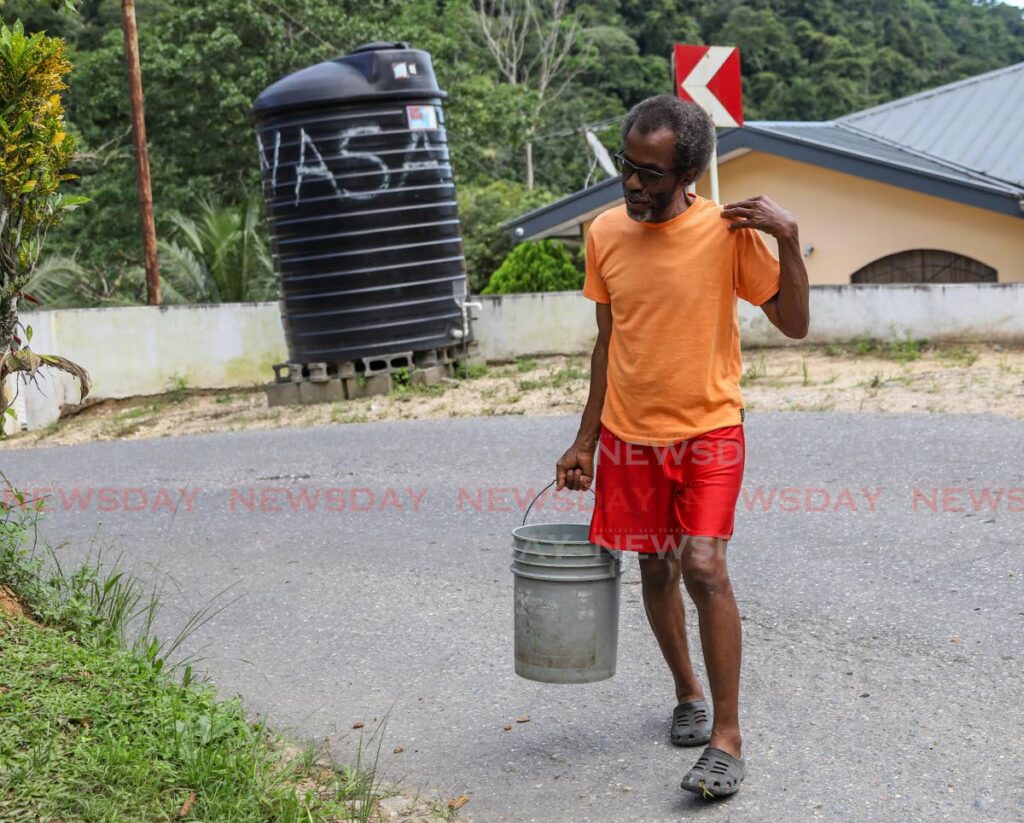Met Office predicts weekend rains to bring Tobago relief

TOBAGO’S reservoir levels are below-average to critical and if the dry spell persists, the Water and Sewerage Authority (WASA) warns that distribution challenges could worsen in the short term.
Fortunately, the Met Office has simultaneously projected a wetter rainy season, expected to begin after a tropical wave this weekend.
The impending rains are expected to compensate for the dry spells decimating WASA’s supply, affecting thousands of people and forcing some businesses and at least one state agency to close for the day.
The Met Office has forecast above-average rain from into August for most of Tobago, which is “good for (Tobago), bearing in mind what’s going on with the reservoirs,” supervisor of meteorological services in Tobago Carolyn De Coteau said at a press conference, hosted by Tobago House of Assembly Chief Secretary Farley Augustine, on Friday.
Augustine invited De Coteau, WASA Tobago regional head Brian Williams and Tobago Emergency Management Agency (TEMA) director Allan Stewart to collectively address water shortages.
“The rainy season is getting here, slowly but surely,” De Coteau said, cautioning that the island should prepare for potential flooding.
The Met Office predicted six named storms for the season, two more than the yearly average between 1991-2020. Three hurricanes are expected during the season (June 1-November 30).
Tobago averaged one hurricane per year over the same 20-year period.
“This doesn’t mean all these things are going to affect us,” De Coteau said, stressing that Tobago is still more exposed than Trinidad and should take extra precautions.
Heat spells are expected in August and mid-September, coinciding with the peak of the hurricane season. Southwest Tobago, she said, will be mostly but not solely affected.
Williams half-jokingly thanked De Coteau for her relatively positive outlook, as water sources in Tobago have dried to alarming levels.
WASA produces an average of 12 million gallons of water daily for the Tobago public, via surface and ground sources, split almost evenly.
However, production stood at nearly 13 million gallons at the start of the year but has slid to a current mark of about 10.5 million.
“We have a shortfall of 1.5 million gallons, which is a lot of water,” said Williams. “And if the trend continues, we’re in for some problems.”
He said a day or two of heavy rainfall in Tobago normally replenishes the reservoirs to healthy levels, but added that “a lot of the time…the rain doesn’t fall in the areas that are useful to WASA.”
Williams showed the current levels and identified Charlotteville as the worst affected, with an 80 per cent reduction in its supply. He said it is one of several areas where potential supply from other sources is affected by terrain, but promised WASA will overcome.
Williams vowed WASA will deliver water trucking services in the short term, with demand assessed daily to determine the number of trucks to dispatch.
The schedules are available online and are published in the newspapers.
He said WASA is equally committed to seeking long-term solutions for the water issues in Tobago, and has undertaken several development initiatives with the Ministry of Public Utilities.
Williams also said WASA is in talks with the THA to have it on board to ensure “all Tobagonians, independent of their leanings, have access to a consistent and sustainable supply across all seasons in the face of the climatic challenges we now face.
“The development programme is geared at exactly that.”
He said a desalination plan is earmarked for Charlotteville as one of the initial beneficiary communities.
A new water treatment plant is planned for Goldsborough, a new pipeline on Store Bay Local Road, new booster stations in Bloody Bay and Castara and a well in Orange Hill. “Notwithstanding we are facing a number of challenges, imagine if these projects are completed,” Williams said. “We know this can only work if we work together.”
He encouraged Tobagonians to do their part by conserving water.
Augustine agreed, saying, “You have a responsibility to manage the resources well. Now is not the time to be wetting the lawn…Grass is resilient; it will bounce back.”
He said the THA was on board with many of WASA’s proposals and has already provided an ongoing project.
Augustine was asked about the desalination plant project and reaffirmed it is at the feasibility stage.
“It is something that THA will be willing to work with WASA on. Given we have this perennial issue, we can’t be a small island in the middle of all this water and...not be able to deliver water on a 24-hour basis to all our people all the time.
“So it is something we want to action almost immediately. But you could imagine a matter like a desalination plant will require public consultation, because that will naturally have environmental implications that must be considered.”


Comments
"Met Office predicts weekend rains to bring Tobago relief"